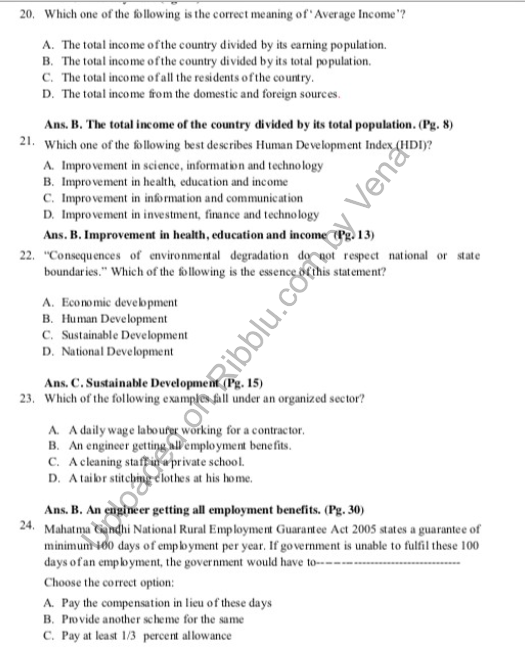MCQ Questions for Class 10 Social Science with Answers PDF Free Download is very important for students who want to improve their grades in CBSE board examination. Solving these Multiple Choice Questions with answers provided here simplifies learning. Practise these Social Science MCQs for Class 10 provided with answers and tabulated chapter-wise, and improve your score.
MCQ Questions for Class 10 Social Science with Answers PDF Download
Solving NCERT Online Social Science MCQ Questions for Class 10 with Answers aids students to better understand concepts and recall learnt concepts while solving. There is no substitute for consistent practice whether one wants to understand a concept thoroughly or one wants to score better. By practicing more Social Science Multiple Choice Questions with Answers, students can improve their speed and accuracy which can help them during their board exam.Here’s the list of chapters on the “Social Science – Class 10” subject covering important topics. You can practice the MCQs chapter by chapter starting from the 1st chapter or you can jump to any chapter of your choice..
MCQ Questions for Class 10 Social Science with Answers: History
MCQ Questions for CBSE Class 10 Social Science History with Answers : India and the Contemporary World – II
- MCQ Questions – Chapter 8 Novels, Society and History
- MCQ Questions – Chapter 6 Work, Life and Leisure
- MCQ Questions – Chapter 5 Print Culture And Modern World
- MCQ Questions – Chapter 4 Age of Industrialisation
- MCQ Questions – Chapter 3 Making Global World
- MCQ Questions – Chapter 2 Nationalism In India
- MCQ Questions – Chapter 1 Rise Of Nationalism In Europe
MCQ Questions for Class 10 Social Science with Answers: Geography
MCQ Questions for CBSE Class 10 Social Science Geography with Answers : Contemporary India – II
- MCQ Questions – Chapter 6 Manufacturing Industries
- MCQ Questions – Chapter 5 Minerals and Energy Resources
- MCQ Questions – Chapter 4 Agriculture
- MCQ Questions – Chapter 3 Water Resources
- MCQ Questions – Chapter 2 Forest and Wildlife Resources
- MCQ Questions – Chapter 1 Resources and Development
MCQ Questions for Class 10 Social Science with Answers: Civics
MCQ Questions for CBSE Class 10 Social Science Civics (Political Science) with Answers : Democratic Politics – II
- MCQ Questions – Chapter 6 Political Parties
- MCQ Questions – Chapter 5 Popular Struggles And Movements
- MCQ Questions – Chapter 4 Gender Religion Caste
- MCQ Questions – Chapter 3 Democracy Diversity
- MCQ Questions – Chapter 2 Federalism
- MCQ Questions – Chapter 1 Power Sharing
MCQ Questions for Class 10 Social Science with Answers: Economics
MCQ Questions for CBSE Class 10 Social Science Economics with Answers : Understanding Economic Development – II
- MCQ Questions – Chapter 5 Consumer Rights
- MCQ Questions – Chapter 4 Globalisation And Indian Economy
- MCQ Questions – Chapter 3 Money And Credit
- MCQ Questions – Chapter 2 Sectors Of Indian Economy
- MCQ Questions – Chapter 1 Development

Class 10 Social Science Multiple Choice Questions Online Quiz
Who among the following was the founder of ‘Young Europe’ underground secret society in Berne?
A. Giuseppe Garibaldi
B. GiuseppeMazzini
C. Count Cavour
D. Otto Von Bismark
Which of the following was the result of the Act of Union, 1707?
A. Unification of Germany
B. Unification of the kingdom of Great Britain
C. Unification of Italy
D. Unification of Vietnam
Identify the correct statement with regard to the ‘Zollverein’ from the following options:
A. It was a coalition of Prussian states for med to manage political alliances.
B. Its aim was to bind the Prussia politically into an association.
C. It was a Custom Union at the initiative of Prussia.
D. It helped to awaken and raise national sentiment in Europe.
Who among the following was the founder of ‘Young Europe’ underground secret society in Berne?
A. Giuseppe Garibaldi
B. GiuseppeMazzini
C. Count Cavour
D. Otto Von Bismark
Which of the following was the result of the Act of Union, 1707?
A. Unification of Germany
B. Unification of the kingdom of GreatBritain
C. Unification of Italy
D. Unification of Vietnam
Identify the correct statement with regard to the ‘Zollverein’ from the following options:
A. It was a coalition of Prussian states formed to manage political alliances.
B. Its aim was to bind the Prussia politically into an association.
C. It was a Custom Union at the initiative of Prussia.
D. It helped to awaken and raise national sentiment in Europe.
Why is the power shared amongst different organs of government called as horizontal distribution of power? Identify the correct reason.
A. It gives judiciary more power than legislature and executive.
B. It allows different organs of government to be placed at the same level.
C. It gives representation to different ideologies at political level.
D. It influences and coordinates in the decision making process.
In India’s federal system, the Central and the State governments have the power to legislate on all those subjects which are included in the:
A. Union list
B. Statelist
C. Concurrent list
D. Residuary subjects
Which of the following states of India enjoy special powers under article 371 (A) of the Constitution of India?
A. Nagaland
B. Rajasthan
C. Punjab
D. TamilNadu